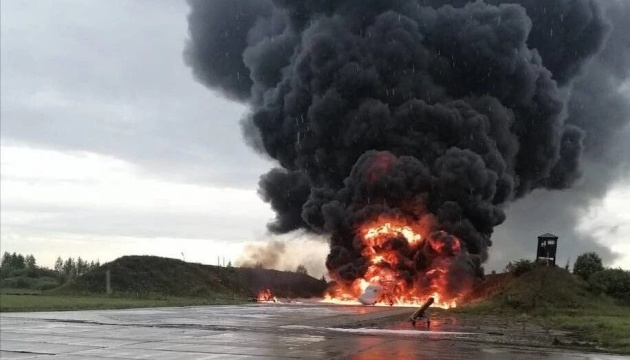SBU special operations change the rules of the game: why strikes on Russian aviation and the Crimean bridge are of strategic importance
4 June 14:48
This week, the Security Service of Ukraine has twice inflicted serious damage and destruction on Russia. First, the special operation “Spider’s Web”, which damaged 41 bombers, and then a lightning strike on the Kerch Bridge.
Then, on June 3, the SBU announced the successful conduct of another special operation, during which the Crimean bridge was hit for the third time. According to the SBU, preparations for the operation lasted several months. First, the agents mined the bridge’s pillars, and on the morning of June 3, one of the explosive devices was detonated. The explosion occurred at 04:44, and no civilian casualties were reported.
The agency clarified that 1,100 kilograms of TNT equivalent explosives were used in the attack. The bridge’s underwater supports at the bottom level were heavily damaged. According to the SBU, the bridge structure is currently in a critical condition.
The operation was personally supervised by the Head of the SBU, Lieutenant General Vasyl Malyuk, who was also responsible for its planning and coordination. He emphasized that the objects that Russia illegally uses on Ukrainian territory are quite legitimate targets for Ukrainian special services.
“Especially if we take into account that the bridge served to supply Russian troops. Crimea is Ukraine, and we will respond decisively to any manifestations of occupation,” Malyuk summarized.
Currently, the Kerch Bridge is bursting at the seams and is in a state of emergency.
Another “explosive” news was the information that the special operation “Web”, as a result of which the SBU destroyed 41 Russian strategic aviation aircraft, had been prepared for more than a year and a half. It is reported that it was personally coordinated by the President of Ukraine and Supreme Commander-in-Chief Volodymyr Zelenskyy. The direct implementation was taken over by the head of the SBU Vasyl Malyuk and his team.
The operation turned out to be one of the most complex in terms of logistics. First, FPV drones were smuggled into Russia, and later mobile wooden houses. On the territory of the Russian Federation, these drones were hidden under the roofs of structures transported by trucks. At a certain time, the roofs were opened remotely, and the drones were sent to their targets – Russian strategic bombers at air bases.
Can we assume that drone attacks on Russia will now become more regular and under what conditions can this happen – further in the article
It all depends on political decisions
In an exclusive commentary for
“If Bankova Street lifts the ban on strikes on Russia’s oil industry, the frequency and effectiveness of drone attacks will undoubtedly increase. If the restrictions remain, it will resemble a game of give-and-take,” the colonel explains in a commentary
. "Komersant Ukrainian"
The expert emphasizes that even the successful downing of dozens of aircraft will not be able to stop the Russian aviation, as its fleet is extremely large.
“To make it impossible for Russian aviation to fly, it is not enough to destroy more than 40 aircraft. They have more than a hundred strategic planes, and thousands of planes in total. You can’t destroy them all,” he explains.
At the same time, there is another, more effective way – to deprive Russia of aviation fuel.
“To stop their aviation, it is enough to destroy several refineries that produce aviation fuel,” says Svitan.
The military expert emphasizes that there are technical capabilities for strikes, and the Ukrainian Defense Forces have the tools to hit critical targets deep in Russia’s rear. However, the final decision is political.
“The effectiveness of drones is determined not so much by technology as by political will. And as long as there are no strikes on oil refineries, it is premature to talk about the strategic effect of the attacks,” Svitan is convinced.
“The Web”: a strong blow, but not decisive
Former SBU officer, military expert Ivan Stupak in a conversation with journalists
“It’s like a kitchen: something is ready, something is still cooking. What is ready is launched. Then comes the second, third operation. There may be months of pause between them. This is normal. But it is an illusion to say that drones will be flying across Russia every week,” Stupak says.
The expert urges not to exaggerate the significance of the latest strike on Russian strategic aviation.
“According to SIPRI, as of the end of 2024, Russia had 55 Tu-95 and Tu-160 strategic bombers. Other sources say 63. They also have about 60 Tu-22s. That is, a total of up to 120 aircraft capable of striking Ukraine. We have disabled up to 20 of them. So, there are about a hundred left. And, unfortunately, this still allows them to continue rocket attacks,” the expert said.
So Stupak calls on the society to keep a cool head and not to fall into premature euphoria.
“This is an important victory, but not the final one. The strike on Russian strategic aviation is only one step. The war is ongoing, and Russia still has significant resources to continue its aggression,” Stupak said.
Thus, this week shows that Ukrainian special services are capable of inflicting pain on the enemy not only on the front line but also in the deepest rear. Operation “Web” and the attack on the Crimean bridge are a demonstration of a mature, well-thought-out strategy, where each target has military and psychological significance.
However, experts emphasize that despite the importance of what has been achieved, these actions do not change the strategic balance until political decisions are made to strike critical infrastructure, in particular, the Russian oil refinery.









